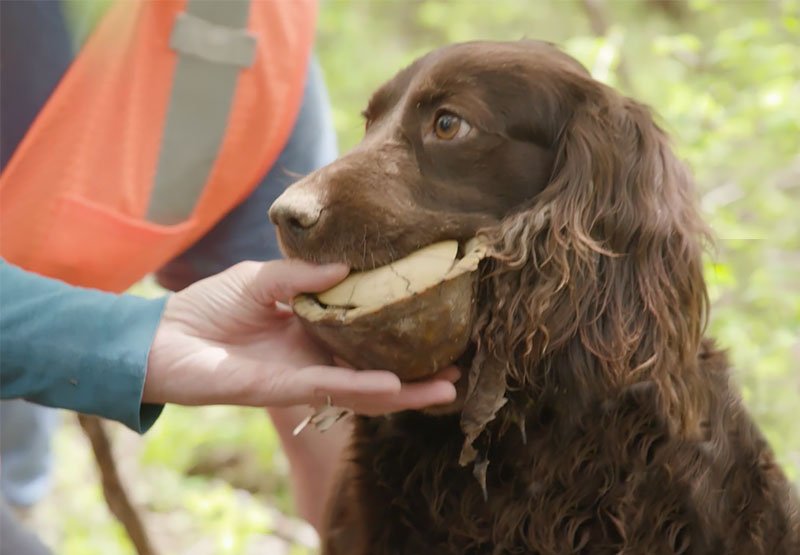Noses to the bottom, seven Boykin Spaniels vary throughout open grassland and right into a forest of oak and hickory timber. They’re adopted by a rangy man in an orange high-viz vest and a pack of researchers in inexperienced vests. As one of many canines nears a discover—on this case, a three-toed field turtle—her tail begins wagging wildly. As soon as she locates the turtle, she fastidiously picks it up in her mouth, then returns to the group of people trailing in her wake. There, she releases it right into a ready hand, will get loads of reward, then goes again to work.
Boykin Spaniels, a compact flushing and retrieving breed that originated in South Carolina (and SC’s state canine), are recognized for his or her tender mouths—a behavioral tendency to select up, maintain and carry quarry gently. This talent, together with their glorious sense of odor, is being put to good use by the St. Louis Zoo’s Field Turtle Venture, run by researchers with the zoo’s Institute for Conservation Drugs.
Analysis Fellow Maris Brenn-White, DVM, MPVM, explains why the canines had been enlisted on this challenge: “[We have] been finding out field turtles within the St. Louis space for 9 years now. In that point, we’ve realized how troublesome it may be to search out field turtles simply by wanting with the human eye. Field turtles have advanced to mix in completely with their environment, which is ideal for escaping predators however presents researchers with an actual problem. Based mostly on a few of our current analysis findings, we began a new research on an rising virus in three-toed field turtles that required us to find a variety of field turtles in a brief time period.”
Understanding the successes that different conservation teams have had utilizing detection canines, and the research which have proven their security and efficacy, the researchers requested their friends for options. Right here’s what they heard: On the subject of turtles, John Rucker is the person to see. Rucker, a retired instructor and self-taught naturalist, is a South Carolina native who now lives off the grid in Montana, the place he raises and trains Boykin Spaniels. For nearly twenty years, his summers have been spent touring the nation together with his “turtle canines” to help scientists with box-turtle conservation work.
GET THE BARK NEWSLETTER IN YOUR INBOX!
Join and get the solutions to your questions.
Earlier in his life, Rucker lived in North Carolina and skilled canines to retrieve birds bagged by hunters. Then, a few of his canines spontaneously began to convey him turtles (unhurt and undamaged, as you’d count on from a soft-mouthed canine). He rewarded and formed that habits and grew his turtle-tracking pack with new canines, who realized a big a part of their job from watching and following the older canines. Ultimately, he determined to show the accident right into a enterprise and let the canines do what they naturally needed to do.
Rucker begins turtle-dog coaching when the pups are three to 4 months previous. Utilizing scent and a kind he created from the shell of a useless turtle, he teaches the canines to acknowledge the turtle form. By the point they be a part of older and skilled turtle canines within the discipline, he says, they’re in a position to make the leap from the shape to the wild field turtle pretty simply.
That is the primary time the Institute for Conservation Drugs has used canines as helpers in any of their research. Nonetheless, Dr. Brenn-White notes, they’re “finding out canines’ free-living kin—coyotes and foxes—on the Saint Louis Zoo WildCare Park property.” She goes on to make a thought-provoking level: “Understanding how our pet and dealing canines work together with and have an effect on native species is a vital a part of that research, and of a lot of our native and world conservation work. In conservation, we regularly encounter canines as predators, rivals and sources of illness for threatened wildlife. This was a very nice alternative to see how canines can work for conservation after we prepare and take care of them in the appropriate methods.”


